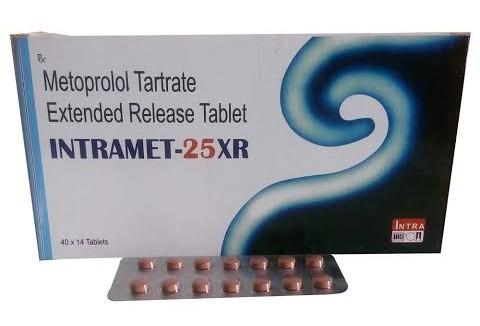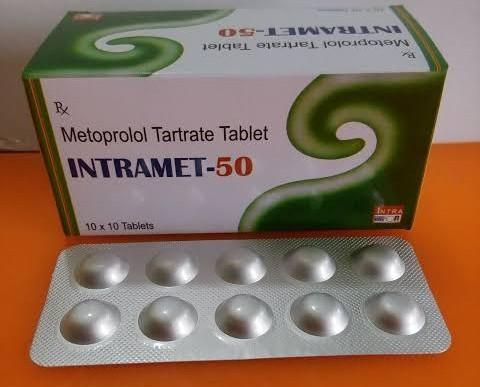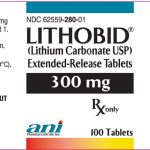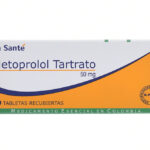Intramet Pills: Uses, Dosages, Side Effects, Interactions

Intramet is a brand of Metoprolol produced by Acme Pharmaceuticals. Intramet is a beta-blocker used to treat chest pain (angina), heart failure, and high blood pressure. Lowering high blood pressure helps prevent strokes, heart attacks, and kidney problems. This drug works by blocking the action of certain natural chemicals in your body (such as epinephrine) that affect the heart and blood vessels. This lowers heart rate, blood pressure, and strain on the heart.
The regular Intramet tablet contains metoprolol tartrate while Intramet XR contains metoprolol succinate which is an extended-release version of metoprolol, that remains in your bloodstream for a longer time. This drug is available in two forms; Intramet 25 Tablet XR and Intramet 50mg Tablet XR.

How should I take Intramet?
Intramet comes as a tablet and an extended-release (long-acting) tablet to take by mouth. The regular tablet is usually taken once or twice a day with meals or immediately after meals.
Typical dosing for Intramet (metoprolol tartrate)
- The typical dose to treat high blood pressure is 100-450 mg by mouth in divided doses daily.
- The typical dose to treat chest pain is 100-400 mg by mouth in 2 divided doses daily.
- The typical dose for early treatment of a heart attack is 50 mg by mouth every 6 hours for 48 hours.
- The typical dose for late treatment of a heart attack is 100 mg by mouth twice a day for at least 3 months.
Intramet extended-release tablet is usually taken once a day. To help you remember to take metoprolol, take it around the same time(s) every day. Follow the directions on your prescription label carefully, and ask your doctor or pharmacist to explain any part you do not understand. Take metoprolol exactly as directed. Do not take more or less of it or take it more often than prescribed by your doctor.
Intramet extended-release tablet may be split. Swallow the whole or half tablets whole; do not chew or crush them.
Typical dosing for Intramet XR (metoprolol succinate)
• The typical dose to treat high blood pressure is 25-100 mg by mouth once a day.
• The typical dose to treat chest pains is 100 mg by mouth once a day.
• The typical dose to treat heart failure is 12.5-25 mg once a day.
• The typical dose for early treatment of a heart attack is 25-50 mg by mouth once a day.
Your doctor may start you on a low dose of Intramet and gradually increase your dose.

What should I avoid while taking Intramet?
Try not to drink alcohol. It could make you more drowsy and dizzy while you are taking Intramet XR.
Intramet Contraindications
• This medicine is not right for everyone. Do not use if you had an allergic reaction to metoprolol or similar medicines, or if you have certain blood circulation or heart problems. Ask your doctor about these problems.
Intramet Warnings
• Keep all medicine out of the reach of children. Never share your medicine with anyone.
• Your doctor will do lab tests at regular visits to check on the effects of this medicine. Keep all appointments.
• This medicine may make you dizzy or drowsy. Do not drive or do anything else that could be dangerous until you know how this medicine affects you.
• Tell your doctor if you are pregnant or breastfeeding, or if you have blood vessel, heart, or circulation problems (including heart failure, rhythm problems, or a slow heartbeat). Tell your doctor if you have kidney disease, liver disease, diabetes, lung disease (including asthma), thyroid problems, pheochromocytoma (adrenal gland tumor), or a history of allergies.
• This medicine may worsen the symptoms of heart failure while the dose is being adjusted.
• Do not stop using this medicine suddenly. Your doctor will need to slowly decrease your dose before you stop it completely.
• Tell any doctor or dentist who treats you that you are using this medicine. You may need to stop using this medicine several days before you have surgery or medical tests.
• This medicine could lower your blood pressure too much, especially when you first use it or if you are dehydrated. Stand or sit up slowly if you feel lightheaded or dizzy.
What side effects can Intramet cause?
Intramet may cause side effects. Tell your doctor if any of these symptoms are severe or do not go away:
- dizziness or lightheadedness
- tiredness
- depression
- nausea
- dry mouth
- stomach pain
- vomiting
- gas or bloating
- heartburn
- constipation
- rash or itching
- cold hands and feet
- runny nose
Some side effects can be serious.
The following symptoms are uncommon, but if you experience any of them, call your doctor immediately:
- shortness of breath
- wheezing
- swelling of the hands, feet, ankles, or lower legs
- weight gain
- fainting
- rapid, pounding, or irregular heartbeat
Intramet may cause other side effects. Call your doctor if you have any unusual problems while taking this medication.
If you experience a serious side effect, you or your doctor may send a report to the Food and Drug Administration’s (FDA) MedWatch Adverse Event Reporting program online (http://www.fda.gov/Safety/MedWatch) or by phone (1-800-332-1088).
What medications can interact with Intramet?
Some medicines can affect how Intramet works. Tell your doctor if you are using any of the following:
- Clonidine, digoxin, dipyridamole, guanethidine, hydralazine, hydroxychloroquine, methyldopa, prazosin, quinidine, reserpineCalcium channel blocker (including amlodipine, diltiazem, verapamil) Ergot medicine, MAO inhibitor, or medicine to treat depression (including bupropion, clomipramine, desipramine, fluoxetine, fluvoxamine, paroxetine, sertraline), Medicine for heart rhythm problems (including propafenone), Medicine to treat HIV/AIDS (including ritonavir) Medicine to treat infection (including terbinafine), Medicine to treat mental illness (including chlorpromazine, fluphenazine, haloperidol, thioridazine)
- Do not drink alcohol while you are using this medicine.
- Do not stop using this medicine suddenly. Your doctor will need to slowly decrease your dose before you stop it completely.
- Tell any doctor or dentist who treats you that you are using this medicine. You may need to stop using this medicine several days before you have surgery or medical tests.
- This medicine could lower your blood pressure too much, especially when you first use it or if you are dehydrated. Stand or sit up slowly if you feel lightheaded or dizzy.
- This medicine may make you dizzy or drowsy. Do not drive or do anything else that could be dangerous until you know how this medicine affects you.
- Your doctor will check your progress and the effects of this medicine at regular visits. Keep all appointments.
- Keep all medicine out of the reach of children. Never share your medicine with anyone.





